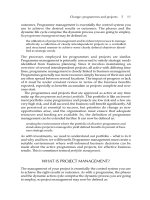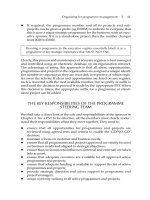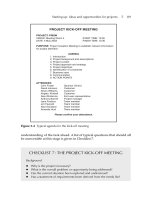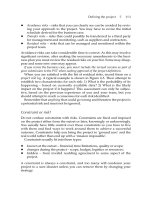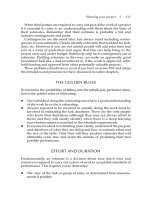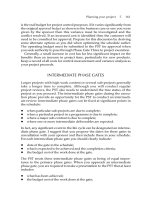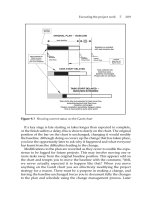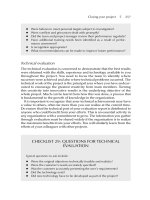Management a practical introduction 3rd kinicky chapter 04
Bạn đang xem bản rút gọn của tài liệu. Xem và tải ngay bản đầy đủ của tài liệu tại đây (240.8 KB, 49 trang )
Management
A Practical Introduction
Third Edition
Angelo Kinicki &
Brian K. Williams
Kinicki/Williams, Management: A Practical Introduction 3e ©2008, McGraw-Hill/Irwin
Chapter 4: Global Management
Managing Across Borders
Globalization
You & International Management
Why & How Companies Expand Internationally
Economic & Political-Legal Differences
Regional Economic Cooperation
Cultural Differences
Kinicki/Williams, Management: A Practical Introduction 3e ©2008, McGraw-Hill/Irwin
4.1 Globalization: The Collapse Of
Time & Distance
Kinicki/Williams, Management: A Practical Introduction 3e ©2008, McGraw-Hill/Irwin
4.1 Globalization: The Collapse Of
Time & Distance
WHAT IS GLOBALIZATION?
Globalization is the trend of the world economy
toward becoming a more interdependent system
Today, we are witnessing a shrinking of time and
space as air travel and the electronic media have
made it easier for people around the world to
communicate with each other
We call this the global village
Kinicki/Williams, Management: A Practical Introduction 3e ©2008, McGraw-Hill/Irwin
The Global Economy
Global Economy
refers to the
increasing tendency
of economies of the
world to interact with
one another as one
market instead of
many national
markets.
McGraw-Hill/Irwin
Kinicki/Williams, Management: A Practical Introduction
3e ©2008,
McGraw-Hill/Irwin
© 2006
The McGraw-Hill
Companies, Inc. All rights rese
4.1 Globalization: The Collapse Of
Time & Distance
IS GLOBALIZATION A GOOD THING?
Growth in jobs and income in one country means
growth in jobs and income in other countries—a winwin situation
However, global interdependency can be negative
when negative events in one country generate
negative events in other countries
Outsourcing jobs also brings negative effects to the
country that loses the jobs
Kinicki/Williams, Management: A Practical Introduction 3e ©2008, McGraw-Hill/Irwin
The Global Economy: Positive
and Negative Effects
Negative Effects
Can have some insecurity
Economic crises in some countries
can soon affect other countries
Positive Effects
U.S. exports, international trade, and
U.S. workers are connected
Growth of jobs and income in other
countries will mean growth of jobs and
income for the U.S.
McGraw-Hill/Irwin
Kinicki/Williams, Management: A Practical Introduction
3e ©2008,
McGraw-Hill/Irwin
© 2006
The McGraw-Hill
Companies, Inc. All rights rese
4.1 Globalization: The Collapse Of
Time & Distance
Two types of firms are emerging in the world
economy: mergers of huge companies into even
bigger companies, and small, fast-moving start-up
companies
Companies in many industries are merging with
other companies to be bigger, cross-border
enterprises
Almost any firm can operate globally today
Thanks to the Internet and World Wide Web, small
companies can get started more easily, and small
companies can maneuver faster
Kinicki/Williams, Management: A Practical Introduction 3e ©2008, McGraw-Hill/Irwin
Globalization: The Collapse Of
Time & Distance
WHY SHOULD YOU LEARN ABOUT
INTERNATIONAL MANAGEMENT?
Kinicki/Williams, Management: A Practical Introduction 3e ©2008, McGraw-Hill/Irwin
4.1 Globalization: The Collapse Of
Time & Distance
WHY SHOULD YOU LEARN ABOUT
INTERNATIONAL MANAGEMENT?
International managers oversee the conduct of
operations in, or with, organizations in foreign
countries
Kinicki/Williams, Management: A Practical Introduction 3e ©2008, McGraw-Hill/Irwin
International Management
Multinational Corporation:
is a business firm with
operations in several
countries.
Multinational Organization:
is a not-for-profit organization
with operations in several
countries.
McGraw-Hill/Irwin
Kinicki/Williams, Management: A Practical Introduction
3e ©2008,
McGraw-Hill/Irwin
© 2006
The McGraw-Hill
Companies, Inc. All rights rese
4.1 Globalization: The Collapse Of
Time & Distance
You need to learn about international management because
you may find yourself in any of the following situations:
dealing with customers or partners from different cultures
buying components, raw materials, or services from foreign
suppliers
working for a superior from a foreign country
working in a foreign subsidiary or for a foreign firm located in
another country
Kinicki/Williams, Management: A Practical Introduction 3e ©2008, McGraw-Hill/Irwin
4.2 You & International Management
There are three primary attitudes among international
managers:
managers who believe that their native country, culture,
language, and behavior are superior to all others are
ethnocentric managers
managers who believe native managers in foreign offices
best understand native personnel and practices, and so the
home office should leave them alone are polycentric
managers
Geocentric managers accept that there are differences and
similarities between home and foreign personnel and
practices, and that they should use whatever techniques are
most effective
Kinicki/Williams, Management: A Practical Introduction 3e ©2008, McGraw-Hill/Irwin
E4-10
The Successful International
Manager:
Is:
Is Not:
Geocentric:
accepts diversity.
McGraw-Hill/Irwin
Ethnocentric: believe
that they are culturally
superior.
Polycentric: feels
native management in
native country is best.
Kinicki/Williams, Management: A Practical Introduction
3e ©2008,
McGraw-Hill/Irwin
© 2006
The McGraw-Hill
Companies, Inc. All rights rese
Chapter 4: Global Management
CLASSROOM PERFORMANCE SYSTEM
A manager that believes his way is best is a ______
manager.
A) geocentric
B) polycentric
C) transcentric
D) ethnocentric
Kinicki/Williams, Management: A Practical Introduction 3e ©2008, McGraw-Hill/Irwin
Chapter 4: Global Management
CLASSROOM PERFORMANCE SYSTEM
A manager that believes his way is best is a ______
manager.
A) geocentric
B) polycentric
C) transcentric
D) ethnocentric
Kinicki/Williams, Management: A Practical Introduction 3e ©2008, McGraw-Hill/Irwin
E4-11
McGraw-Hill/Irwin
Why Companies Expand
Internationally
Kinicki/Williams, Management: A Practical Introduction
3e ©2008,
McGraw-Hill/Irwin
© 2006
The McGraw-Hill
Companies, Inc. All rights rese
4.3 Why & How Companies
Expand Internationally
WHY DO COMPANIES EXPAND INTERNATIONALLY?
Firms expand internationally to take advantage of:
1. Availability of supplies - some companies have to go to
foreign countries to get their supplies
2. New markets - when domestic demand declines,
companies need to find new markets
3. Lower labor costs - manufacturing is cheaper where wages
are lower
4. Access to finance capital - foreign financing, either private
or through a government, can entice companies to go
international
5. Avoidance of tariffs & import quotas - companies might
establish a foreign subsidiary to avoid tariffs or quotas
Kinicki/Williams, Management: A Practical Introduction 3e ©2008, McGraw-Hill/Irwin
E4-9
You and International
Management
You may deal with foreign customers or partners
You may deal with foreign suppliers
You may work for a foreign firm in the United
States
You may work for an American firm outside the
United States
McGraw-Hill/Irwin
Kinicki/Williams, Management: A Practical Introduction
3e ©2008,
McGraw-Hill/Irwin
© 2006
The McGraw-Hill
Companies, Inc. All rights rese
Practical Action: What You Can Do to
Prepare for Overseas Assignments
Persuade your boss that you can handle overseas
duty and that the organization will benefit
Study up on your host country
Become skilled in the language
Become skilled in the culture
McGraw-Hill/Irwin
Kinicki/Williams, Management: A Practical Introduction
3e ©2008,
McGraw-Hill/Irwin
© 2006
The McGraw-Hill
Companies, Inc. All rights rese
Practical Action: What You Can Do to
Prepare for Overseas Assignments (Cont.)
Skills Most Lacking for Managers Overseas
For Men (percentage)
For Women
(percentage)
Foreign language
31
27
Interpersonal skills
14
7
Administrative
11
5
Management
8
8
Technical
8
15
Basic computer
7
9
Problem solving
5
6
McGraw-Hill/Irwin
Kinicki/Williams, Management: A Practical Introduction
3e ©2008,
McGraw-Hill/Irwin
© 2006
The McGraw-Hill
Companies, Inc. All rights rese
E4-13
Panel 4.1
How Companies Expand
Internationally
Global
Outsourcing
Lowest risk
&
investment
McGraw-Hill/Irwin
Importing,
Licensing
Joint
Wholly
exporting, &
&
ventures
owned
countertrading franchising
subsidiaries
Highest
risk &
investment
Kinicki/Williams, Management: A Practical Introduction
3e ©2008,
McGraw-Hill/Irwin
© 2006
The McGraw-Hill
Companies, Inc. All rights rese
4.3 Why & How Companies
Expand Internationally
HOW DO COMPANIES EXPAND
INTERNATIONALLY?
There are five ways to expand internationally:
1. Global outsourcing - many companies engage in global
outsourcing (using suppliers outside the country to provide
goods and services) – sometimes called contract
manufacturing
2. Importing, exporting, & countertrading - a company that
buys goods outside the country and resells them domestically
is importing, while a company that produces goods
domestically and sells them outside the country is exporting,
and countertrading occurs when a firm barters for goods
Kinicki/Williams, Management: A Practical Introduction 3e ©2008, McGraw-Hill/Irwin
4.3 Why & How Companies
Expand Internationally
3. Licensing & franchising - licensing (when a company allows
a foreign company to pay a fee to make or distribute the first
company’s product or service) and franchising (when a
company allows a foreign company to pay a fee and a share
of the profits in exchange for using the first company’s brand
name and a package of materials and services) are very
similar
4. Joint ventures - when firms join forces to share the risks
and rewards of starting a new enterprise together in a foreign
country, they form a joint venture or strategic alliance
5. Wholly-owned subsidiaries - a foreign subsidiary that is
totally owned and controlled by an organization is a wholly
owned subsidiary
Kinicki/Williams, Management: A Practical Introduction 3e ©2008, McGraw-Hill/Irwin
4.4 Economic & Political-Legal Differences
HOW CAN MANAGERS ADJUST TO ECONOMIC
DIFFERENCES IN OTHER COUNTRIES?
Managers need to consider economic systems,
economic development, infrastructure and resources,
and currency exchange rates in foreign markets
There are three types of economic systems: free
market, command, and mixed
Kinicki/Williams, Management: A Practical Introduction 3e ©2008, McGraw-Hill/Irwin

